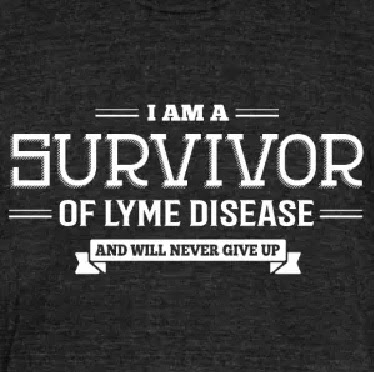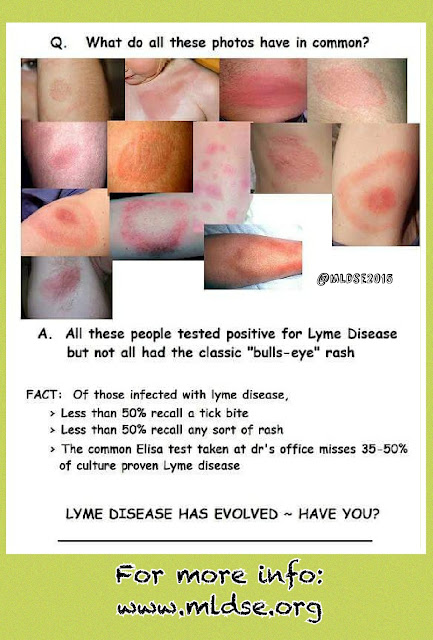Lyme Rant!
Author: Paula Jackson Jones
Orig Published: 09/01/2017
This
week’s article, I’m calling my Lyme Rant, is based on the outcome of my
week-long stay at the Union Fair, from all my community interactions with
people and from my 3+ year odyssey as a Lyme advocate warrior. It’s based on
first-hand experience as a patient, as an advocate and as someone who is not
willing to settle for status quo.
As
a society, we’re being fed conflicting information from many sources. One
source says Lyme and tick-borne is hard to catch but easy to treat. Another
source strongly recommends using repellent and prevention practices as
tick-borne disease is on the rise here in Maine, with a heavy concentration in
the Midcoast region. Another source (finally) admits that current testing is
faulty and that a medical provider must go by clinical symptoms to make a
diagnosis and treat, while yet another source states that in order for you to
have a positive confirmation, you must meet certain criteria.
I’ve
been writing for weeks now about the need for continued use of repellents and
prevention practices because I am seeing first hand that the number of new
cases of Lyme, Anaplasmosis and Babesiosis continue to rise. Just last week, a
local paper wrote about a man suffering from the devastating effects of
Babesia. Early this summer, a 2 year old, a teenage and a 41 year old woman
(all from out of state) died from complications from misdiagnosed Rocky
Mountain Spotted Fever. And just 2 weeks ago, a CT man died from complications
with Babesia.
So
on one hand, we’re told that Lyme and tick-borne disease is no big deal and on
the other hand, the media is reporting preventable deaths. NO BIG DEAL? Tell that to the family’s who have lost a
loved one due to complications from Lyme and tick-borne disease. With all the
up-to-date research, with expert advice and instruction that for endemic
regions, by all accounts Lyme and tick-borne disease is to be treated based on
clinical symptoms and that testing is not always reliable. And yet, I am still hearing, years after
fighting my own battle, that drs are still relying on unreliable tests and
treating with outdated guidelines. People are still walking around sick and
there is no excuse for it!
 |
| Lyme Protest at State Capitol House, Augusta, Maine 2014 |
If
it walks like a duck and sounds like a duck, most of us would call it a duck,
right? But what if, amid all that
information, a provider continued to reference an online but outdated source in
order to diagnosis you? Or worse yet, rely on information that they knew from
years ago but have not gotten any up-to-date training on new guidelines,
symptomology of co-infections and treatment options? If you always do what
you’ve always done, you’ll always get what you always got, right? Sheep.
I’m
ranting because years after I was misdiagnosed and mistreated by educated medical
providers, I am still hearing the same stories from today’s patients. Why Why
Why?? Why are people today still being misdiagnosed? Why, in this endemic
region, are people still being mistreated. But more importantly, why are our
medical providers in the heart of the endemic region not recognizing this
immediately? Why are they not learning from the death’s and severe cases?
Medical providers from Yale, Harvard, John Hopkins and many other educational establishments are on the cutting edge of medical break throughs in hopes of making a difference in the lives of patients. With research constantly expanding, these doctors live in the up-to-date moment of testing and treatment options. They are discovering new strains, with new symptoms, resistant to mainstream treatment.
http://www.ilads.org/education/physician-training.php
The ILADEF Physician Training Program, a groundbreaking project vital to fostering excellence in care for Lyme disease patients, directly addresses challenges in properly diagnosing and treating Lyme and other tickborne diseases. The Training Program provides medical and other healthcare practitioners the opportunity to study with Lyme-literate healthcare professionals. Through this experience, participants will develop the skills necessary to properly diagnose and treat Lyme disease. These professionals will be able to return to their community with enhanced skills and the ability to provide superior care to Lyme patients, improving the health and quality of life for those that suffer from the most debilitating effects of Lyme disease.
http://www.lymecme.info
LymeCME.info is a website dedicated to bringing reliable scientific and medical information to the attention of healthcare professionals. LymeCME.info provides accredited CME programs on Lyme disease and other tick-borne illnesses for physicians and other healthcare professionals.
With
all the available medical training, there is no excuse for doctors to be so
divided where Lyme and tick-borne disease is concerned. The outdated IDSA
guidelines that so many providers CHOOSE to follow has a single footnote at the
bottom that reads as follows:
These guidelines were developed and issued on
behalf of the Infectious Diseases Society of America. It is important to
realize that guidelines cannot always account for individual variation among
patients. They are not intended to supplant physician judgment with respect to
particular patients or special clinical situations. The Infectious Diseases
Society of America considers adherence to these guidelines to be voluntary,
with the ultimate determination regarding their application to be made by the
physician in the light of each patient's individual circumstances.
It was never intended to be mandatory, therefore, cannot account for individual variations or supercede
a physician’s knowledge in light of each individual’s circumstances.
~ Paula





Comments
Post a Comment